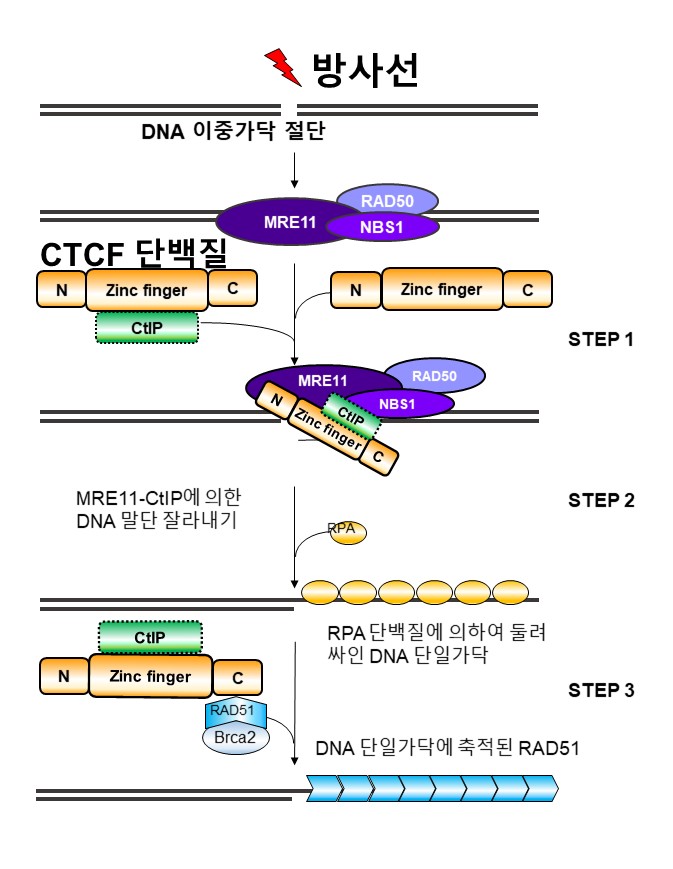글로벌 연구동향
방사선생물학
- [Nucleic Acids Res.] CTCF cooperates with CtIP to drive homologous recombination repair of double-strand breaks.
아주대 / 황순영, 이종수*
- 출처
- Nucleic Acids Res.
- 등재일
- 2019 Jul 24. pii: gkz639. doi: 10.1093/nar/gkz639.
- 저널이슈번호
- 내용

Abstract
The pleiotropic CCCTC-binding factor (CTCF) plays a role in homologous recombination (HR) repair of DNA double-strand breaks (DSBs). However, the precise mechanistic role of CTCF in HR remains largely unclear. Here, we show that CTCF engages in DNA end resection, which is the initial, crucial step in HR, through its interactions with MRE11 and CtIP. Depletion of CTCF profoundly impairs HR and attenuates CtIP recruitment at DSBs. CTCF physically interacts with MRE11 and CtIP and promotes CtIP recruitment to sites of DNA damage. Subsequently, CTCF facilitates DNA end resection to allow HR, in conjunction with MRE11-CtIP. Notably, the zinc finger domain of CTCF binds to both MRE11 and CtIP and enables proficient CtIP recruitment, DNA end resection and HR. The N-terminus of CTCF is able to bind to only MRE11 and its C-terminus is incapable of binding to MRE11 and CtIP, thereby resulting in compromised CtIP recruitment, DSB resection and HR. Overall, this suggests an important function of CTCF in DNA end resection through the recruitment of CtIP at DSBs. Collectively, our findings identify a critical role of CTCF at the first control point in selecting the HR repair pathway.
Author informationHwang SY1, Kang MA1, Baik CJ1, Lee Y1, Hang NT1, Kim BG2, Han JS2, Jeong JH3, Park D1, Myung K2, Lee JS1.
1
Department of Life Sciences and Cellulomics Institute Ajou University, Suwon 16499, Korea.
2
Center for Genomic Integrity, Institute for Basic Science, UNIST, Ulsan 44919, Korea.
3
Division of Applied Radiation Bioscience, Korea Institute of Radiological and Medical Science, Seoul 01812, Korea.
- 연구소개
- 손상된 유전체를 복구하는 일은 암을 비롯한 각종 질병의 억제에서 매우 중요하나, 일단 암이 유발된 환자에서는 방사선 치료를 포함하여 우리의 유전체를 손상시키는 약물을 통한 극심한 유전체 손상을 유도하여 암세포만 선택적으로 사멸시키는 전략은 항암 치료에 널리 이용되고 있습니다. 따라서, 방사선 치료에서 암세포에서 유전체 손상 복구를 억제하는 시스템을 발견하는 연구는 암치료 관점에서 매우 중요합니다. 본 연구진은 방사선 등 DNA 이중가닥이 끊어졌을 때 이를 정확하게 복구시키는 “CTCF” 단백질의 작용과 그 기전을 규명하였습니다. CTCF는 기존에 유전체 조직화, 유전자 각인, 발생에서 중요한 역할을 한다고 알려져 있었습니다. 이 연구를 통해 CTCF가 유전자의 정확한 복구과정에서 핵심적인 조절자 역할을 한다는 것을 밝혔습니다. 이 결과를 역으로 이용하여, CTCF의 작용을 억제시키는 전략을 방사선과 동시 병행치료에 이용하는 경우 암세포의 사멸을 효과적으로 촉진하여, 향후 방사선 치료 효과를 제고할 가능성을 기대할 수 있다고 사료됩니다.
- 덧글달기
- 이전글 [Cell Mol Neurobiol.] The Role Played by SLUG, an Epithelial-Mesenchymal Transition Factor, in Invasion and Therapeutic Resistance of Malignant Glioma.
- 다음글 [Cancer Sci.] Hyaluronic acid synthase 2 promotes malignant phenotypes of colorectal cancer cells through transforming growth factor beta signaling.









